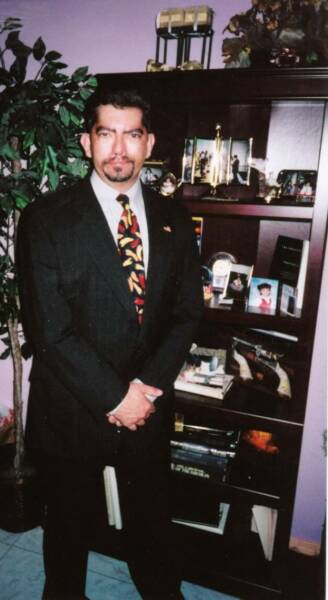Greeting Mr. Langworthy:
April 21, 1836, San Jacinto Day, is indeed a great day in the history of Texas and the United State of America. Before I continue, I would like to add that I am extraordinarily proud to be both a Texas (a Tejano) and an American.
My family, for which Garza county is named, founded the original Spanish colonies in Texas and started the first cattle and horse ranches here nearly four hundred years ago.
About 165 years ago my ancestors, the De la Garza, lived in south Texas on the family hacienda which encompassed land on both sides of the Rio Grande. They lived well, but troubled times were ahead.
In 1835, General Antonio Lopez de Santana suspended the constitution of 1824 and martial law was declared. There was open rebellion in the southern Mexico, but, to my ancestors, that was one thousand miles away. To the North, many immigrants from America and elsewhere had arrived during the previous decade. They came to Texas hoping for free land. Mexico wished to develop Texas. To do so, they appointed Impresarios to oversee its settlement. In order to receive this free land these people agreed, among other things, to learn Spanish, become Catholic, bring no slaves, renounce their previous citizenship, and swear allegiance to Mexico. Thousands came, and they all agreed.
Then, in October 1835, soldados went to Gonzalez to collect a cannon they had left previously and they were attacked with that same cannon! Sam Houston, formerly the Governor of Tennessee, and, at that time, an agent for Andrew Jackson, President of the United States, called for these Americans (who were supposed to be Mexicans) to come to arms against Mexico. In March of 1836, those same men and one or two Mexican citizens met in a cabin on the Brazos River. They had the audacity to call the place, “Washington on the Brazos.” They drafted a declaration of independence stating they had no intention of becoming Catholic, nor giving up the slaves they had kept illegally (without slaves they could not competitively raise cotton, their primary cash crop). They also claimed they had neither rights nor representation since the constitution had been suspended. That may have been true, but many native Mexicans in Texas, “Tejanos”, (as they were called then and now) thought the Americans were really motivated to steal Texas for America. It was no secret that America was desperate to conquer the continent and Texas which encompassed land north to what is now Utah was the next step to the west after the Louisiana Purchase.
Patriotism runs deep among Mexicans and that was proved when thousands of Mexican soldados died trying to recapture Mission San Antonio de Valero (the Alamo). For “Tejanos,” like my ancestors, they would have favored fighting for their country. Texas was their home and the Americans intended to take it.
Looking at the past this way, I can see how the bloodshed of the war was great and why passions still run deep. After the revolution, hostilities continued in south Texas for many years eventually leading to the Mexican American war in 1846 and the subsequent disenfranchisement of Spanish surnamed Americans living in Texas.
My point here is that history is an interpretation like a different version of a song. It’s still the same song but sounds differently depending of the singer’s feelings. This is my song.
Respectfully submitted,
Mr. Lauro Antonio Garza
Retired Police Detective, Entrepreneur,
Political Analyst, and Author
Please contact Lauro Garza directly at:
lauroantoniogarza@hotmail.com
larrygarzaadvocacy@hotmail.com
latinotalktexas@hotmail.com
or by telephone at: 281-236-8294 cellular.
